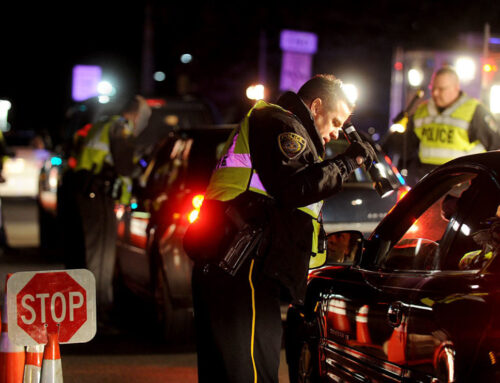By Adam D. Schmaelzle, Esq.
*Queue the long unnecessary narrative….
Meet Bob. Bob works across town at a paper mill and takes the bus to work. For the last three months, Bob has been saving up his money to buy his wife a new pair earrings for their 10-year anniversary. He decides that after work, he will head to the jewelry store, purchase the earrings, and surprise his wife later on that night.
On the morning of the anniversary, Bob happens to spill his coffee on his work shirt, forcing him to change the shirt, and predictably causing him to miss the bus. As he stands on the sidewalk with his head in his hands a miracle happens! Bob’s coworker Ed, comes driving up the street in his 1995 Toyota Tercel and stops to talk to Bob. Soon after, Ed offers to give Bob a ride to work, and the two go on their way.
As they make their way to the paper mill, a police car shows up behind Ed with its lights on. Ed pulls the car over. The officer tells Ed that he was speeding and that his inspection sticker was out of date. Ed begins acting suspicious. Sure enough, the officer asks Ed if he could search the car, and Ed injudiciously gives consent. Upon searching the trunk, the officer finds a large trash bag filled with a couple of kilos of cocaine along with a scale and some small-sized bags. He places both Bob and Ed under arrest for trafficking cocaine. He also seizes $2,200 from Bob’s pocket along with some smaller items. Not the anniversary Bob’s wife was expecting.
After retaining a criminal defense attorney, Bob is let out on bail. Over the next couple of years, Bob and his lawyer make numerous appearances in court, and ultimately go to trial. Sure enough, the Commonwealth failed to meet its burden of proof and Bob becomes a free man once again.
Feeling as though his wife had been through enough, Bob decides to use the $2,200 to buy that pair of earrings he meant to get his wife before the whole fiasco. Unfortunately for Bob, the prosecutor’s office decided to split his money with the police department.
But wait a second… Bob was innocent. How can that be? Shouldn’t Bob get his money back? Not necessarily. Massachusetts General Law Chapter 94c Section 47 provides that, “certain property shall be subject to forfeiture to the Commonwealth and all property rights therein shall be in the commonwealth.” This is known as an asset forfeiture law. In Massachusetts, any money, which was intended to be furnished by any person in exchange for or relating to the distribution of a controlled substance, will be subject to forfeiture.
But as we all know now, Bob was innocent, and that money was to be used for the purchase of a pair of earrings, rather than drugs. How then could he have forfeited his $2,200? Well, somewhere in the mess of papers he received concerning his case, Bob missed a document, which contained a notice to appear in civil court for a forfeiture proceeding. This means, that while Bob was busy concerning himself with a potential prison sentence, the Commonwealth moved for forfeiture of the money that was seized in connection with Bob’s arrest. As a result, Bob never appeared in civil court, a judgment was executed and the money officially became property of the state.
At this point you might be asking the obvious question; If a defendant is presumed innocent until he is found guilty, how can the state acquire his property before a final determination is made in his case? The answer is hidden within the intended purpose of forfeiture laws and was addressed in Commonwealth v. Fourteen Thousand Two Hundred Dollars, 421 Mass 1 (1995), where it was stated that, “Where an action has been brought to impose a forfeiture of the proceeds from unlawful drug sales, we have said that the action is remedial, as opposed to punitive.” ID. This means that if the state wishes to seek forfeiture of any proceeds from criminal activity, it should not be considered punishment because the person has no possessory interest or lawful ownership right to that property, and therefore should be considered remedial. ID. Why is this important? Because if it is believed that if an individual who acquired money in a criminal manner should have no legal right to that money, then an individual like Bob, who acquired that money legally, should have no issue winning his forfeiture case (had he appeared). Right? Wrong. Because a forfeiture proceeding is considered remedial rather than a method of punishment, the burden of proof for the Commonwealth becomes similar to its burden when seeking an indictment, which is probable cause. This means that unlike Bob’s criminal case, where the prosecution was unable to prove beyond a reasonable doubt that Bob had knowledge of the cocaine in Ed’s car, they will only need to prove that there was a genuine reason to believe that there was a connection between Bob’s money, and the cocaine in the car at the forfeiture proceeding. This also means that hearsay statements, which would otherwise be inadmissible in a criminal trial, could be offered to support the prosecutions case. It also means that Bob will have a much harder time proving to the court that his money was acquired legitimately and is unrelated to his drug trafficking case and therefore should not be forfeitable.
So what happened to Bob’s money? The statute provides that any money, which was forfeited, should be split equally between the DA’s office and the police department who was involved in the seizure.
I would also like to point out the fact that these proceedings are not just limited to money. Keeping in mind that this was a federal case, the U.S attorney’s office attempted to acquire a multi-million dollar motel in Tewksbury Massachusetts last year after discovering drug activity going on within the motel. The owners were inevitably found to have taken reasonable actions to prevent crime on the property, and were found to be innocent of any drug related offenses and the action was dismissed. Link below.
Most of the time people are way too wrapped up in their criminal matter to remember to deal with a civil forfeiture. However, all is not lost. If you happen to find yourself in a similar situation, look to the statute! M.G.L Chapter 94c §47(f) provides that if the “owner” of the property that was seized, brings a motion to the court at the time of the forfeiture hearing, the court MAY continue the hearing on the petition pending the outcome of any criminal trial. If you end up getting acquitted, you chances of getting your property back will be much better.
If you have any questions, or feel as though I have made a mistake, Please feel free to contact me at 774-314-9124.
Links:
1. Commonwealth v. Fourteen Thousand Two Hundred Dollars
3. Commonwealth v. Bruce Brown
4. United States of America v. 434 Main Street, Tewksbury MA (Caswell Opinion)






